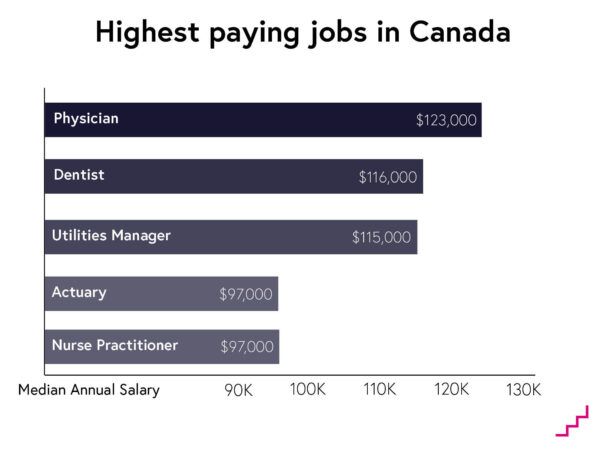8 of the highest-paying jobs in Canada in 2023
Looking to find what the highest paying jobs in Canada are at the moment? Check out our list of some of the highest paying careers in the country.

Canada is a country with a wide range of high-paying industries. Along with the usual suspects such as healthcare, IT, and finance, industries such as construction, oil and gas, and mining are all thriving. With this in mind, we take a look at some of the highest-paying jobs in Canada.
Of course, a job’s pay isn’t the only factor worth considering when looking at potential careers. Equally important is that you have a passion for the field, as well as a good work-life balance and a positive work environment.
Below, we’ve highlighted 8 of the best-paying jobs in Canada with salary data from Payscale.
1. Physician/doctor
What is a physician?
Canada has a shortage of locally trained medical staff at the moment, meaning there is a huge demand for physicians (also known as general practitioners or doctors) in the country. As such, this is one of the highest-paying jobs in Canada.
Physicians are responsible for diagnosing and treating a range of physical and mental ailments, seeing patients from the community and prescribing medication. Given their importance and scarcity, this is one of the best-paying jobs in Canada right now.
How do you become a physician?
To become a qualified doctor, you must complete a medical degree, such as a Doctor of Medicine degree. You will also need certification from either the College of Family Physicians of Canada (CFPC) or the Royal College of Physicians and Surgeons of Canada (RCPSC). Additionally, you’ll need to register with the medical regulatory body in the province or territory you wish to work in.
How much do physicians make?
The median salary for a physician in Canada is $123,000.
Discover our Healthcare courses
If you want to one day become a doctor, why not start by learning about some of the fundamentals of various areas of healthcare? This includes topics such as anatomy, genetics, medical technology and disease outbreak prevention.
2. Dentist
What is a dentist?
Dentists are trained medical professionals who keep your teeth and mouth healthy. They’re responsible for a wide range of practices and procedures, such as oral health check-ups, minor operations, and dental surgery. You’ll often find that dentists specialise in one area of dentistry.
How do you become a dentist?
To start with, you’ll need to have at least a year of pre-dentistry study at university, although this could span up to four years. Once you’ve completed this, you’ll need a degree from a recognised dental program. Much like doctors, you’ll also have to register with the regulatory body in the province or territory you’re working in. However, as we can see, this rigorous training makes it among the highest-paying jobs in Canada.
How much do dentists make?
The median salary for a dentist in Canada is $116,000.
If you want to find out more about the fundamentals of dentistry, we have a range of courses on topics such as paediatric dentistry, dental radiography and dental photography.
-

 The University of Sheffield Discover DentistryHealthcare & Medicine,Science, Engineering & Maths
The University of Sheffield Discover DentistryHealthcare & Medicine,Science, Engineering & Maths
3. Utilities Manager
What is a utilities manager?
Utilities are things like electrical power, water and natural gas. A utilities manager is responsible for the various distribution systems, plants and facilities that deal with these resources. They work in both the public and private sector, often overseeing large teams of specialists. It’s a job that requires a wide and varied knowledge base.
How do you become a utilities manager?
There are several routes you can take to become a utilities manager. A good place to start is with a degree in a related field, such as electrical engineering. From here, you’ll need to gain experience working in the industry, working your way up the chain to supervisor and then manager.
How much do utilities managers make?
The median salary for a utilities manager in Canada is $115,000.
Discover our ‘Energy Systems Integration’ course
With this course, you’ll explore some of the innovative solutions in the field of sustainable energy, and how they may impact the energy market. You also might enjoy our Sustainable Energy Access for Communities course by UCL.
4. Statistician or Actuary
What is a statistician or actuary?
Statisticians (similar to data scientists) work to gather and interpret data for their clients. An actuary is essentially a statistician working specifically within the insurance industry. Both use mathematical and statistical models to work out probabilities of future occurrences.
How to become a statistician or actuary?
Due to the highly mathematical nature of these professions, you’ll usually need a degree in mathematics, statistics or a closely related field. Some companies will look for candidates with a master’s degree. If you want to go into a specific industry, you’ll need the relevant qualifications. For an actuary job, you’ll need to get professional accreditation from the Canadian Institute of Actuaries.
How much do statisticians or actuaries make?
The median salary for an actuary in Canada is $97,000.
If you’re hoping to one day work as a statistician, an online maths course can help you master some of the fundamentals you’ll need. Alternatively, our Data Analysis and Fundamental Statistics course might be useful.






5. Nurse Practitioner
What is a nurse practitioner?
Nurse practitioners are healthcare professionals that are trained in the assessment, diagnosis, and treatment of patients. It’s a job that requires detailed knowledge of medical care, and it’s a career that’s in high demand across much of North America. Given the skills needed and the shortage of nurse practitioners, it’s little surprise that it’s one of the best-paying jobs in Canada at the moment.
How do you become a nurse practitioner?
It’s often quite a long road to becoming a nurse practitioner. Usually, you’ll need at least a master’s degree in nursing, but if you want to specialise in a certain field, you may need additional qualifications. Depending on the province you work in, you might have to register with a professional body before you can work.
How much do nurse practitioners make?
The median salary for nurse practitioners in Canada is $92,000.
Explore our ‘Public Health and Nursing’ ExpertTrack
Nursing is a broad field with many areas of specialisation, including end of life care, crisis management, and clinical supervision. Check out our range of online nursing courses to start your learning journey today, or try our Introduction to Nursing course by KCL.

6. Construction Manager
What is a construction manager?
Last on our list of the best-paying jobs in Canada is that of construction manager. This role, as you might expect, involves overseeing construction projects. It’s a varied job that requires organisation, budget knowledge, and industry experience.
How do you become a construction manager?
In most instances, you’ll need a relevant degree, such as construction technology or civil engineering. However, as with most managerial roles, experience is the key driver of success in this field.
How much do construction managers make?
The median salary for a construction manager in Canada is $92,000.
Discover our ‘Step Into Construction’ course
With this course, you’ll look at the roles and opportunities available to you in the construction industry, and the pathways to get you into the sector. We also have a fantastic range of construction courses if you want to explore your options.
7. Mining Engineer
What is a mining engineer?
The extraction of natural resources is big business in the country, which is why this is one of the highest-paying jobs in Canada. Mining engineers are professionals who provide technical support and directions for the process of extraction, whether it’s coal, minerals or ore. As providing estimates for mining construction projects, they may also select and maintain equipment.
How do you become a mining engineer?
Depending on the route you take, you’ll likely require a bachelor’s degree in mining engineering of a similar discipline. You’ll also need some experience in the industry, and will have to work your way up the ranks over several years. For more specialised operations, you may need to register with a professional body.
How much do mining engineers make?
The median salary for a mining engineer in Canada is $87,000.
Discover our ‘Principles of Engineering’ course
If you’re hoping to get into the mining industry as an engineer, a course on the principles of engineering is a great place to start.
8. Attorney or Lawyer
What is an attorney?
Attorneys are responsible for advising their clients of their legal rights and applying the law to specific cases and situations. It’s a role with many different potential avenues, from corporate clients and their business transactions to people within the legal system. You could specialise in areas such as patent litigation, contract law, or criminal cases.
How to become an attorney?
The journey to becoming a lawyer in Canada is a fairly long one, which is why it’s one of the best-paying jobs in the country. Usually, all lawyers trained in Canada must have a Bachelor of Laws (LLB) or Juris Doctor (JD) degree. To get into a law school in Canada, you’ll usually need to graduate from a college, hold a two-year college degree, or have at least a year of undergraduate study under your belt.
How much do attorneys make?
The median salary for an attorney in Canada is $77,000.
Discover our ‘Introduction to Studying Law’ course
Lawyers take on a lot of responsibility for people in all kinds of situations. Learn more with our ExpertTrack on International Human Rights Law.
The highest-paying jobs in Canada
As we’ve seen, there is quite a range of roles and industries represented here. There are also several other notable roles that are among the best-paying careers in Canada. Software engineers (\$78,000), business analysts (\$67,000) and cyber security analysts (\$66,000) also pay very well.
Hopefully, the courses we’ve outlined can help you on your journey to securing the salary and job role you want. Good luck!










